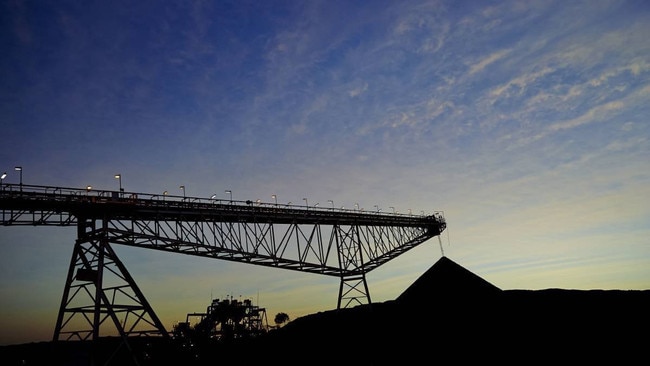Commodities bull market here to stay, says Glencore’s Ivan Glasenberg
Glencore boss Ivan Glasenberg warns China’s attempts to cool metals markets is a short-term manoeuvre unlikely to dampen sentiment.

A major bull market for commodity prices is expected to strengthen on rampant global demand with Glencore boss Ivan Glasenberg warning China’s attempts to cool metals markets was a short-term manoeuvre unlikely to dampen sentiment.
The resources industry is grappling with a surge in demand as big economies roar back to life while also balancing accelerating climate pressures as calls grow for fossil fuels to be replaced by clean energy.
Thermal coal from Newcastle has hit a 13-year high above $US131 a tonne, LNG prices have doubled since February and oil is above $US75 a barrel for the first time since April 2019. Iron ore and copper both broke records in May, prompting China to release its own metal reserves to quell a big price jump in the last year.
Glencore, one of Australia’s biggest miners, said commodity prices would stay high over the medium term.
“Is this a super cycle? I don’t know if you want to call it a super cycle but commodity prices will stay strong for a long while longer. Pure underlying demand and supply fundamentals are putting commodity prices to the levels where they are,” Mr Glasenberg said,
China’s attempts to cool commodity markets were unlikely to work, the Glencore chief added.
“I know recently the Chinese have tried to push it down to bring it back to lower levels. I think that’s a short term game because the underlying fundamentals will keep it at these levels.
“They’re taking some materials from the strategic stockpiles and putting that in the market. Now how big the stockpiles are we don’t know exactly – they can do it for a while but eventually they’ve got to restock,” Mr Glasenberg told the Qatar Economic Forum.
“They can’t keep it at these low levels. So they’ll come back into the market. So I think it’s a short-term phase.”

Big oil producers ExxonMobil, Shell and TotalEnergies told the Forum oil prices could surge to $US100 a barrel due to the industry failing to invest and the fast-paced transition that has seen corporates pinned down on their climate commitments.
But Glencore, which said in 2019 it will abandon the pursuit of large coal acquisitions and freeze production at current levels, questioned whether the rhetoric of ditching fossil fuels was in line with strong demand.
“Cut fossil fuels – that’s fine – but we have to make sure renewables can fill that space and we don’t have a gap. If a gap is going to be there, we’re going to have higher commodity prices,” Mr Glasenberg said.
“Thermal coal is a perfect example. The world has said we want to reduce the amount of thermal coal production, mining companies are definitely not investing in more thermal coal mines, and a lot of the mining companies are even getting rid of their thermal coal mines.”
“So you have supply being disrupted and no new supply coming in, however demand is still there. And today you have Australian coal at $US130 a tonne – that’s what happens when you cut supply and you haven’t found a solution for demand.”
Mining giants would struggle to produce enough metals needed for the global economy to replace fossil fuels with renewable energy, with copper, nickel and cobalt all likely to struggle to meet the supply gap given many of the easier to develop projects were already producing.
“We’ve developed most of the easy projects and now we go into the more difficult regions of the world where there isn’t infrastructure, it’s a harder political environment and I think the mining industry is not ready to add massive new tonnes to the market. With green energy demand, I believe the mining industry will struggle to keep pace.”
Australia remains the biggest supplier of iron ore and LNG to China but coal producers have been forced to find new buyers after a ban on supplies between the two countries over simmering trade tensions.
Export income for Australia from iron ore alone this year is set to eclipse the entire combined annual earnings of LNG, metallurgical coal, gold, thermal coal, oil and several base metals.
The figures underscore Australia’s overwhelming reliance on China as an export market, with annual resources and energy sales of $127bn representing more than the combined annual sales of the next five largest export markets, including Japan, South Korea, Taiwan and India.






To join the conversation, please log in. Don't have an account? Register
Join the conversation, you are commenting as Logout